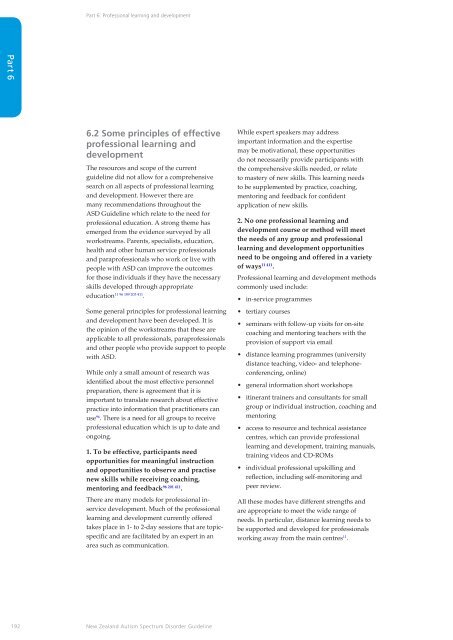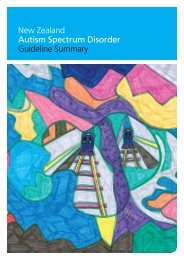New Zealand Autism Spectrum Disorder Guideline - Ministry of Health
New Zealand Autism Spectrum Disorder Guideline - Ministry of Health
New Zealand Autism Spectrum Disorder Guideline - Ministry of Health
Create successful ePaper yourself
Turn your PDF publications into a flip-book with our unique Google optimized e-Paper software.
Part 6: Pr<strong>of</strong>essional learning and development<br />
Part 6<br />
6.2 Some principles <strong>of</strong> effective<br />
pr<strong>of</strong>essional learning and<br />
development<br />
The resources and scope <strong>of</strong> the current<br />
guideline did not allow for a comprehensive<br />
search on all aspects <strong>of</strong> pr<strong>of</strong>essional learning<br />
and development. However there are<br />
many recommendations throughout the<br />
ASD <strong>Guideline</strong> which relate to the need for<br />
pr<strong>of</strong>essional education. A strong theme has<br />
emerged from the evidence surveyed by all<br />
workstreams. Parents, specialists, education,<br />
health and other human service pr<strong>of</strong>essionals<br />
and parapr<strong>of</strong>essionals who work or live with<br />
people with ASD can improve the outcomes<br />
for those individuals if they have the necessary<br />
skills developed through appropriate<br />
education 11 96 189 203 411 .<br />
Some general principles for pr<strong>of</strong>essional learning<br />
and development have been developed. It is<br />
the opinion <strong>of</strong> the workstreams that these are<br />
applicable to all pr<strong>of</strong>essionals, parapr<strong>of</strong>essionals<br />
and other people who provide support to people<br />
with ASD.<br />
While only a small amount <strong>of</strong> research was<br />
identified about the most effective personnel<br />
preparation, there is agreement that it is<br />
important to translate research about effective<br />
practice into information that practitioners can<br />
use 96 . There is a need for all groups to receive<br />
pr<strong>of</strong>essional education which is up to date and<br />
ongoing.<br />
1. To be effective, participants need<br />
opportunities for meaningful instruction<br />
and opportunities to observe and practise<br />
new skills while receiving coaching,<br />
mentoring and feedback 96 201 411 .<br />
There are many models for pr<strong>of</strong>essional inservice<br />
development. Much <strong>of</strong> the pr<strong>of</strong>essional<br />
learning and development currently <strong>of</strong>fered<br />
takes place in 1- to 2-day sessions that are topicspecific<br />
and are facilitated by an expert in an<br />
area such as communication.<br />
While expert speakers may address<br />
important information and the expertise<br />
may be motivational, these opportunities<br />
do not necessarily provide participants with<br />
the comprehensive skills needed, or relate<br />
to mastery <strong>of</strong> new skills. This learning needs<br />
to be supplemented by practice, coaching,<br />
mentoring and feedback for confident<br />
application <strong>of</strong> new skills.<br />
2. No one pr<strong>of</strong>essional learning and<br />
development course or method will meet<br />
the needs <strong>of</strong> any group and pr<strong>of</strong>essional<br />
learning and development opportunities<br />
need to be ongoing and <strong>of</strong>fered in a variety<br />
<strong>of</strong> ways 11 411 .<br />
Pr<strong>of</strong>essional learning and development methods<br />
commonly used include:<br />
• in-service programmes<br />
• tertiary courses<br />
• seminars with follow-up visits for on-site<br />
coaching and mentoring teachers with the<br />
provision <strong>of</strong> support via email<br />
• distance learning programmes (university<br />
distance teaching, video- and telephoneconferencing,<br />
online)<br />
• general information short workshops<br />
• itinerant trainers and consultants for small<br />
group or individual instruction, coaching and<br />
mentoring<br />
• access to resource and technical assistance<br />
centres, which can provide pr<strong>of</strong>essional<br />
learning and development, training manuals,<br />
training videos and CD-ROMs<br />
• individual pr<strong>of</strong>essional upskilling and<br />
reflection, including self-monitoring and<br />
peer review.<br />
All these modes have different strengths and<br />
are appropriate to meet the wide range <strong>of</strong><br />
needs. In particular, distance learning needs to<br />
be supported and developed for pr<strong>of</strong>essionals<br />
working away from the main centres 11 .<br />
192<br />
<strong>New</strong> <strong>Zealand</strong> <strong>Autism</strong> <strong>Spectrum</strong> <strong>Disorder</strong> <strong>Guideline</strong>











